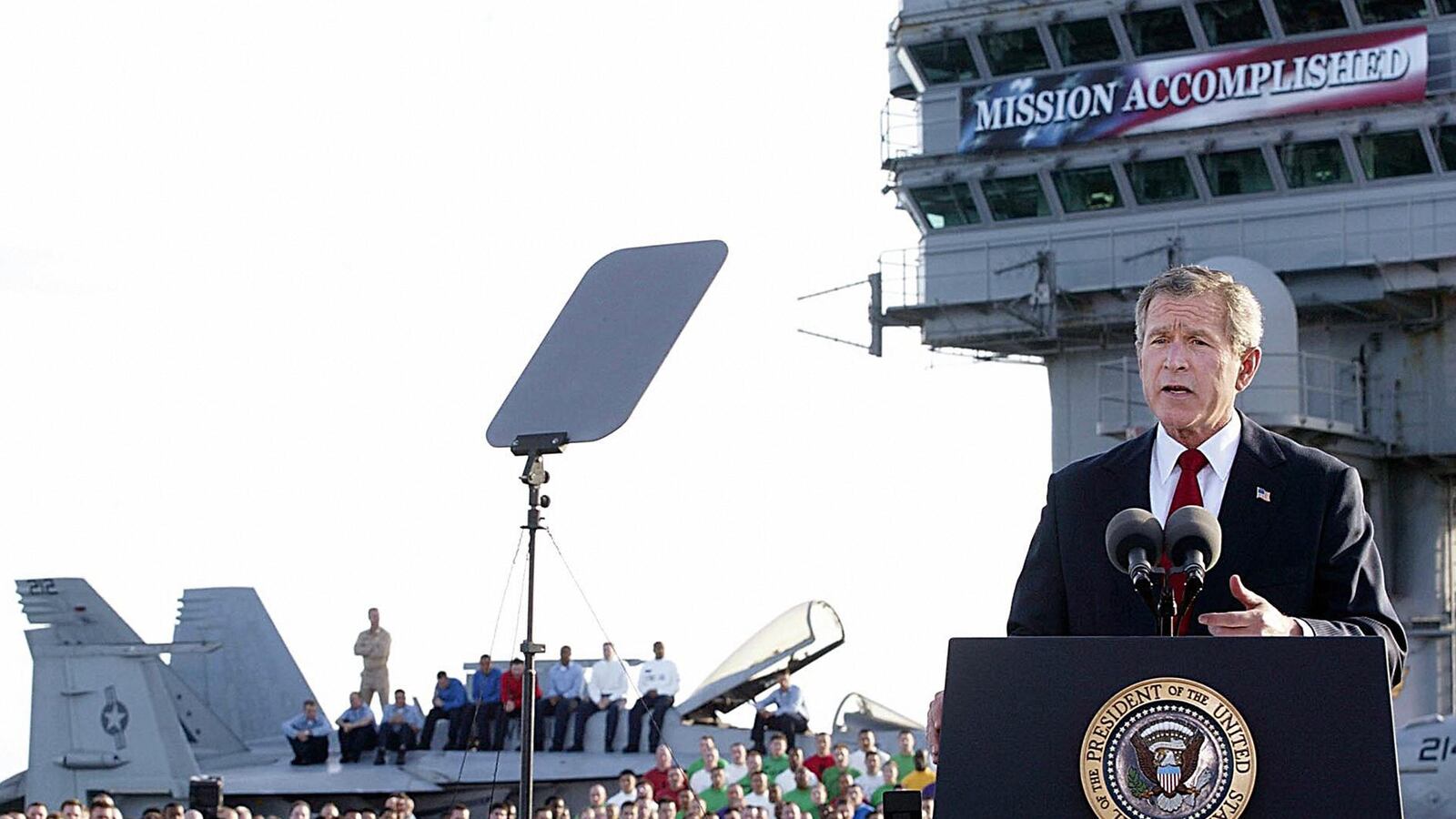After two long, drawn-out, bipartisan, and totally lost wars in Afghanistan and Iraq that aren’t even over yet, it’s finally clear exactly why American foreign policy has gone so tragically wrong in the 21st century.
The culprit, at least according to the leading lights of the Republican Party and the Obama administration, is what Gov. Chris Christie excoriated last summer as “this strain of libertarianism that’s going through both parties...a very dangerous thought.”
Libertarians, says Gov. Rick Perry, are just nouveau isolationists and “isolationist policies make the threat of terrorism even greater.” Writing in National Journal, Washington Post columnist and former George W. Bush speechwriter Michael Gerson compared libertarian pols like Sen. Rand Paul to isolationist Sen. Robert Taft, who notoriously opposed American intervention in World War II and attacked the Nuremberg Trials as illegitimate.
You got that? It’s not our go-it-alone crusaderism and robust military presence all over the world that has managed to lower America’s “favorability” in the eyes of longtime allies and client states such as Britain, Germany, Japan, and Egypt. It’s our hypothetical willingness to stop being globo-cop that’s the issue, not our very real attempts to nation-build and even region-sculpt in parts of the world that have asked us to leave.
To hear the Dick Cheneys and Rick Perrys and John McCains of the world tell it, folks such as Paul, who explicitly calls for military, economic, and political “containment” of “radical Islam,” are “curiously blind,” desperate to withdraw to a “Fortress America,” and just flat-out “crazy.”
Forget for the moment that under both Republican and Democratic commanders-in-chief, libertarians had exactly zero influence on foreign policy—except perhaps for Paul’s leading role in scuttling Obama’s attempt to enter the Syrian civil war last fall.
“Isolationism is not an option,” Obama told the graduating class of West Point earlier this year in a speech that, like most commencement addresses, was mercifully being forgotten even as it was being delivered. Every problem doesn’t have a military solution, explained the man who tripled troop strength in Afghanistan to no observable change in the fortunes of the war there and dispatched planes and people to Libya for...what reason again?
No, said Obama, every problem doesn’t have a military solution, but that doesn’t mean we can’t go to war without notifying Congress or worrying about what it will cost in lives and dollars. Obama’s speech was a meringue of meaninglessness, and in that sense was a perfect encapsulation of his disastrous foreign policy.
America will act in concert with the nations of the word, said Obama, except when it doesn’t want to. Because lots of people die in war, we’ll act only when U.S. national interests are at stake.
But global warming is a national interest and “America’s support for democracy and human rights goes beyond idealism—it is a matter of national security.” So that’s why U.S. special forces were dispatched to Nigeria (even before that country approved such a helping hand) and why American soldiers are traipsing around Africa looking for warlord Joseph Kony.
And troops—well, advisers—are going back to Iraq, six years after this president was elected on a promise to get us out of there.
Obama’s foreign policy certainly hasn’t lacked for the use of force. It has, however, lacked for successes, as became clear during an unintentionally hilarious yet telling State Department press conference in May. State’s Jen Psaki said that, in her view, “the president doesn’t give himself enough credit for what he’s done around the world.”
“Credit for what?” one reporter interrupted. “I’m sorry, credit for what?” The others in the room started laughing.
Around the same time, NBC’s Richard Engel, who is not known as a staunch critic for the administration, was asked to name a few countries with which relations have improved under Obama. His reply? “I think you would be hard pressed to find that...I think the reason is our allies have become confused."
First under Bush and now under Obama, the one constant in American foreign policy is a lack of any conceivable constraint on whatever the president deems expedient at any moment in time. This is disastrous, especially when it comes to military and covert actions, because it precludes any serious public discussion and prioritization.
That’s not just bad for the U.S. It’s also bad for our allies, who have no framework by which to structure their own actions and expectations. The president is allowed to both declare red lines and then to ignore them when they are crossed, to dispatch troops or planes or supplies according to whim. In all of this, Obama in no way represents a break from Bush, but perfect continuity.
As The Daily Beast’s Eli Lake wrote for Reason back in 2010, the roots of this particularly strident new sense of imperial power can be traced back to the authorization of use of military force (AUMF) signed into law just a few days after the 9/11 attacks.
“Just as President Bush said the 9/14 resolution gave him the wartime powers to detain, interrogate, capture, and kill terrorists all over the world,” wrote Lake, “so too does President Obama.” Until recently—and because of pushback from characters such as Rand Paul, his fellow Republican Sen. Mike Lee, and Democratic Sen. Ron Wyden—Congress has been especially deferential to all aspects of executive power when it comes to foreign policy and war-making.
The results are plain to see in the still-smoldering battlefields across the globe and the rapidly deteriorating situations in places as different as Ukraine, Egypt, and even the U.S. border with Mexico. When the executive branch has carte blanche to act however it wants, it can’t act effectively.
What would be a better foreign policy than what we’ve seen over the past 14 or so years? It’s tempting to say, Anything, anything at all. Certainly, at least this much makes immediate sense: The United States should in fact withdraw militarily for good from Iraq and Afghanistan, especially if those countries’ governments implore us to do so. And there are allies in both regions that we should continue to support not just morally, but materially and militarily.
All large-scale and long-term military engagements should actually be put to a specific congressional vote as dictated both by the Constitution and by common sense. The use of military force should be governed not by a set of infinitely expandable terms such as ensuring human rights and expanding democracy, but far narrower and less grandiose ideals of national defense.
As Rand Paul wrote recently in a response to criticisms from Rick Perry and other Republicans, “Anytime someone advocates sending our sons and daughters to war, questions about precise objectives, effective methods and an exit strategy must be thoughtfully answered.”
Most importantly, foreign policy should not be reduced to a synonym for military action and covert operations. The most powerful weapon the United States has for expanding peace and enlarging prosperity has nothing to do with guns and bullets and everything to do with the way in which we have created a nation of 300 million-plus people who generally get along peacefully while pursuing radically different visions of the good life.
To the extent that we share our culture and commerce with the world rather than our drones and disdain, we will not only protect ourselves more effectively, we will actually help more people.
During the Cold War, the United States wasted millions if not billions of dollars on highly mannered, pathetic “cultural exchanges” designed to show that the “free world” could compete against communism in areas such as chess, and classical music. Yet no dissidents ever named a revolution after piano prodigy Van Cliburn; they named their revolution after the Velvet Underground.
Whatever else you can say about radical Islam, it won’t survive an onslaught of prosperity and self-determination for the oppressed peoples of the Middle East. In this it is no existential threat to the United States or the West more broadly.
Similarly, the United States and the West beat back the Russian threat when it was able to focus all elements of its society on beating us like one of Khrushchev’s old shoes. There’s no reason to believe that Putin’s sclerotic basket-case of a country will be tap dancing down Pennsylvania Avenue anytime soon.
For the entirety of the 21st century, leading Democrats and Republicans have shown their inability to conduct foreign policy as anything other than unmitigated disaster. If a libertarian alternative—one that emphasizes cultural and economic exchange and uses military intervention as a limited, last-best-option that should be explicitly sanctioned by Congress—strikes you as immature and unlikely to succeed, that says more about your powers of self-delusion than you’ll ever understand.






